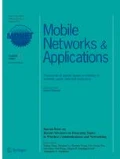Abstract
We describe a new replicated‐object protocol designed for use in mobile and weakly‐connected environments. The protocol differs from previous protocols in combining epidemic information propagation with voting, and in using fixed per‐object currencies for voting. The advantage of epidemic protocols is that data movement only requires pair‐wise communication. Hence, there is no need for a majority quorum to be available and simultaneously connected at any single time. The protocols increase availability by using voting, rather than primary‐copy or primary‐commit schemes. Finally, the use of per‐object currencies allows voting to take place in an entirely decentralized fashion, without any server having complete knowledge of group membership. We show that currency allocation can be used to implement diverse policies. For example, uniform currency distributions emulate traditional voting schemes, while allocating all currency to a single server emulates a primary‐copy scheme. We present simulation results showing both schemes, as well as the performance advantages of using currency proxies to temporarily reallocate currency during planned disconnections. Furthermore, we discuss an initial design of the underlying replicated‐object system and present a basic API.
Similar content being viewed by others
References
D. Agrawal, A.E. Abbadi and R. Steinke, Epidemic algorithms in replicated databases, in: Proc. of the Symposium on Principles of Database Systems, Tucson, AZ (May 1997).
Y. Amir and A. Wool, Evaluating quorum systems over the Internet, in: Fault-Tolerant Computing Symposium (FTCS) (June 1996).
Y. Amir and A. Wool, Optimal availability quorum systems: Theory and practice, Information Processing Letters 65 (April 1998) 223–228.
P.A. Bernstein, V. Hadzilacos and N. Goodman, Concurrency Control and Recovery in Database Systems (Addison-Wesley, Reading, MA, 1987).
A. Dan and F. Parr, The Coyote approach for network centric service applications: Conversational service transactions, a monitor and an application style, in: High Performance Transaction Systems Workshop (HPTS) (1997).
A. Demers, D. Greene, C. Hauser, W. Irish, J. Larson, S. Shenker, H. Sturgis, D. Swinehart and D. Terry, Epidemic algorithms for replicated database maintenance, in: Proc. of the Symposium on Principles of Distributed Computing (August 1987).
D.K. Gifford, Weighted voting for replicated data, in: Proc. of the ACM Symposium on Operating Systems Principles (1979).
J. Gray, P. Helland, P. O'Neil and D. Shasha, The dangers of replications and a solution, in: Proc. of the ACM SIGMOD Internat. Conf. on Management of Data, Montreal, Canada (June 1996).
J. Gray and A. Reuter, Transaction Processing: Concepts and Techniques (Morgan Kaufmann, 1992).
M. Herlihy, A quorum-consensus replication method for abstract data types, ACM Transactions on Computing Systems 4 (February 1986) 32–53.
S. Jajodia and D. Mutchler, Dynamic voting algorithms for maintaining the consistency of a replicated database, ACM Transactions on Database Systems 15 (1990) 230–280.
L. Kawell, S. Beckhardt, T. Halvorsen, R. Ozie and L. Greif, Replicated document management in a group communication system, in: Proc. of the 2nd Conf. on Computer Supported Cooperative Work (1988).
P.J. Keleher, Decentralized replicated-object protocols, in: Proc. of the Symposium on Principles of Distributed Computing (May 1999).
J.J. Kistler and M. Satyanarayanan, Disconnected operation in the Coda file system, in: Proc. of the ACM Symposium on Operating Systems Principles (October 1991).
E.Y. Lotem, I. Keidar and D. Dolev, Dynamic voting for consistent primary components, in: 17th ACM Symposium on Principles of Distributed Computing (June 1997).
J.K. Osterhout, Tcl: An embeddable command language, in: USENIX Winter Conf. (1990).
T.W. Page, R.G. Guy, J.S. Heidemann, D. Ratner, P. Reiher, A. Goel, G.H. Kuenning and G.J. Popek, Perspectives on optimistically replicated peer-to-peer filing, Software-Practice and Experience 28 (February 1998) 155–180.
J.-F. Pâris and D. Long, Efficient dynamic voting algorithms, in: Proc. of the Internat. Conf. on Data Engineering, Los Angeles, CA (February 1988).
D. Peleg and A. Wool, The availability of quorum systems, Information and Computation 123 (1995) 210–223.
K. Petersen, M.J. Spreitzer, D.B. Terry, M.M. Theimer and A.J. Demers, Flexible update propagation for weakly consistent Replication, in: Proc. of the ACM Symposium on Operating System Principles, Saint-Milo, France (October 1997).
M. Rabinovich, N.H. Gehani and A. Kononov, Scalable update propagation in epidemic replicated databases, in: Proc. of the Internat. Conf. on Extending Database Technology, Avignon, France (March 1996).
M. Stonebraker, Concurrency control and consistency of multiple copies of data in distributed INGRES, IEEE Transactions on Software Engineering 3 (May 1979) 188–194.
M. Stonebraker, P.M. Aoki, W. Litwin, A. Pfeffer, A. Sah, J. Sidell, C. Staelin and A. Yu, Mariposa: A wide-area distributed database system, VLDB Journal 5 (1996) 48–63.
D.B. Terry, A.J. Demers, K. Petersen, M. Spreitzer, M. Theimer and B.W. Welch, Session guarantees for weakly consistent replicated data, in: Internat. Conf. on Parallel and Distributed Information Systems (September 1994).
D.B. Terry, M.M. Theimer, K. Petersen, A.J. Demers, M.J. Spreitzer and C.H. Hauser, Managing update conflicts in a weakly connected replicated storage system, in: Proc. of the ACM Symposium on Operating Systems Principles (December 1995).
R.H. Thomas, A majority consensus approach to concurrency control for multiple copy databases, ACM Transactions on Database Systems 4 (1979) 180–209.
C.A. Waldspurger, T. Hogg, B.A. Huberman, J.O. Kephart and W.S. Stornetta, Spawn: A distributed computational economy, IEEE Transactions on Software Engineering 18 (February 1992) 103–117.
C.A. Waldspurger and W.E. Weihl, Lottery scheduling: Flexible proportional-share resource management, in: Proc. of the 1st Symposium on Operating Systems Design and Implementation, Monterey, CA (November 1994).
A. Wool, Quorum systems in replicated databases: Science or fiction? Bulletin of the Technical Committee on Data Engineering 21 (1998) 3–11.
Rights and permissions
About this article
Cite this article
Keleher, P.J., Cetintemel, U. Consistency management in Deno. Mobile Networks and Applications 5, 299–309 (2000). https://doi.org/10.1023/A:1019181200922
Issue Date:
DOI: https://doi.org/10.1023/A:1019181200922




